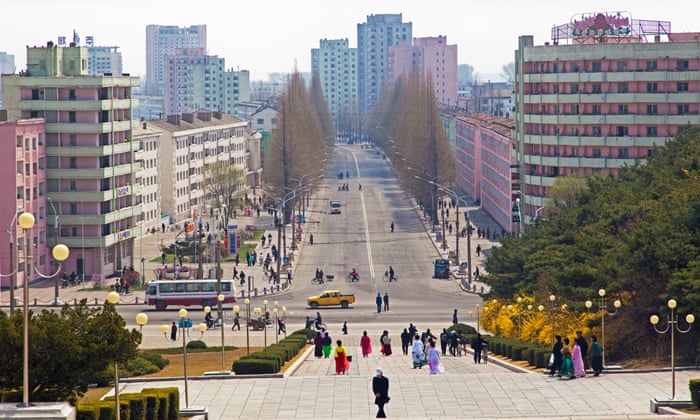This collection has an extraordinary origin story. Bandi, meaning “firefly”, is the pseudonym for a North Korean who has worked, and might still work, as part of the nation’s official writers’ association. In public, Bandi contributed to government-authorised periodicals; in secret, from 1989 to 1995, he wrote stories and poems criticising the state – itself a heroic act in a land where the slightest political dissidence is enough to get you killed. When a close relative told him she planned to leave North Korea, he asked her to take along what had become a 750-page manuscript. She promised, instead, to send for it once she’d escaped. En route, she was picked up by Chinese soldiers; she bribed her way out, made it to South Korea, and enlisted the help of a human rights worker, Do Hee-yun, in retrieving Bandi’s writing. Eventually, in 2013, Do recruited a Chinese friend to smuggle out Bandi’s manuscript while visiting North Korean relatives.
The seven stories in The Accusation were selected from this clandestine manuscript, billed as the first of its kind: defectors have published books in the larger world, but not North Korean residents. Initially published in South Korea, the collection has now been translated into English by Deborah Smith, who with Han Kang won the 2016 Man Booker international prize for the translation of The Vegetarian. In Bandi’s stories, each of which is based on a factual situation, the characters are from a wide range of locales and social classes, from collective farm labourers to the Pyongyang elite. Some of them are relatively powerful, others unable to even obtain a travel permit to visit a dying parent; the accidents of birth determine much of their luck. In North Korea, people are organised into classes according to familial histories of loyalty to the Communist party. To be able to claim a father who died fighting in the Korean war, for instance, is a godsend; to have a relative who has defected to the South is the opposite.
But all the characters in The Accusation inhabit North Korea, and in these stories, as in life, no citizen is safe from the threat of political ruin. It’s a place where, following Kim Il‑sung’s death in 1994, Bandi’s characters leave flowers at altars built in the dictator’s memory “once before each mealtime, morning, noon, and night” because they know the visits are secretly being tallied. With Pyongyang soon stripped bare of flowers, the would-be mourners are forced to find the requisite floral tributes in the mountains. The ground is treacherous, slick with monsoon rains; some of them die in landslides. Still, they persist in trying to find more flowers, afraid that if they don’t, they’ll be charged with antirevolutionary crimes. In another story, a single parent works so hard on a soybean farm that he goes long stretches at a time without seeing his children; nonetheless, when his crop fails, he is indicted for antirevolutionary crimes. A party stalwart’s small son cries at the sight of giant posters depicting Stalin’s and Kim Il-sung’s faces. She tries to prevent his crying, but to little avail: the posters are ubiquitous, and she and her husband are judged guilty of, once again, antirevolutionary crimes.
In story after story, industrious North Koreans, “innocent people whose lives consisted of doing as they were told”, accidentally run afoul of the state and lose their last political illusions. They then get jailed, escape, die, or go mad, but the real culmination of each story occurs in that instant of revelation, when they realise that, despite everything they have always been told, the state is malign. It’s like living in an evil garden, one character says: they are slaves ruled by a demon, secluded from the rest of the world by high walls. The overall structures of Bandi’s stories are almost identical – perhaps too identical, one might think, except that the repetitiveness of their trajectories seems all too accurately to reflect the fates of real-life North Koreans. Bandi’s prose style is rough, jagged with exclamation marks and anguished rhetorical questions: this, too, could be said to fit the exigencies of his book. If poetry, as Wordsworth said, can be glossed as powerful emotion recollected in tranquillity, The Accusation reads like powerful emotion felt right now, in a condition of ongoing crisis.
In the book’s afterword, it is pointed out that, in lieu of trying to escape, Bandi chose to dispatch his manuscript, an “entreaty to shine a spotlight on North Korea’s oppressive regime”. In 2015, the human rights worker, Do Hee-yun, said he hadn’t heard from Bandi in months. He expressed concern that the author’s identity had been discovered, which would have led to death, or worse. “People write books and sing songs claiming that love is this or that,” one of Bandi’s characters says. “But to me, love was indistinguishable from sympathy.” In its scope and courage, The Accusation is an act of great love.
• RO Kwon’s novel Heroics will be published by Riverhead. The Accusation by Bandi is published by Serpent’s Tail. To order a copy for £12.74 (RRP £14.99) go to bookshop.theguardian.com or call 0330 333 6846. Free UK p&p over £10, online orders only. Phone orders min. p&p of £1.99.









